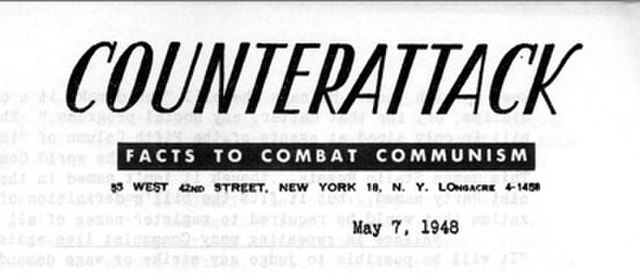Samuel Lawrence Klusman Parks was an American stage and film actor. His career arced from bit player and supporting roles to top billing, before it virtually ended when he admitted to having been a member of a Communist Party cell, which led to his blacklisting by all Hollywood studios. His best known role was Al Jolson, whom he portrayed in two films: The Jolson Story (1946) and Jolson Sings Again (1949).
Parks in 1950
Parks with Teresa Wright in The Happiest Day, a 1954 Ford Theatre presentation.
Parks in 1947
The Hollywood blacklist was an entertainment industry blacklist put in effect in the mid-20th century in the United States during the early years of the Cold War, in Hollywood and elsewhere. Actors, screenwriters, directors, musicians, and other American entertainment professionals were barred from work by the studios.
The May 7, 1948, issue of the Counterattack newsletter warned readers about a radio talk show that had recently expanded its audience by moving from the Mutual network to ABC: "Communist Party members and fellow-travelers have often been guests on [Arthur] Gaeth's program."
The first Hollywood movie to overtly take on McCarthyism, Storm Center was released in 1956. Bette Davis "plays a small-town librarian who refuses, on principle, to remove a book called The Communist Dream from the shelves when the local council deems it subversive".





